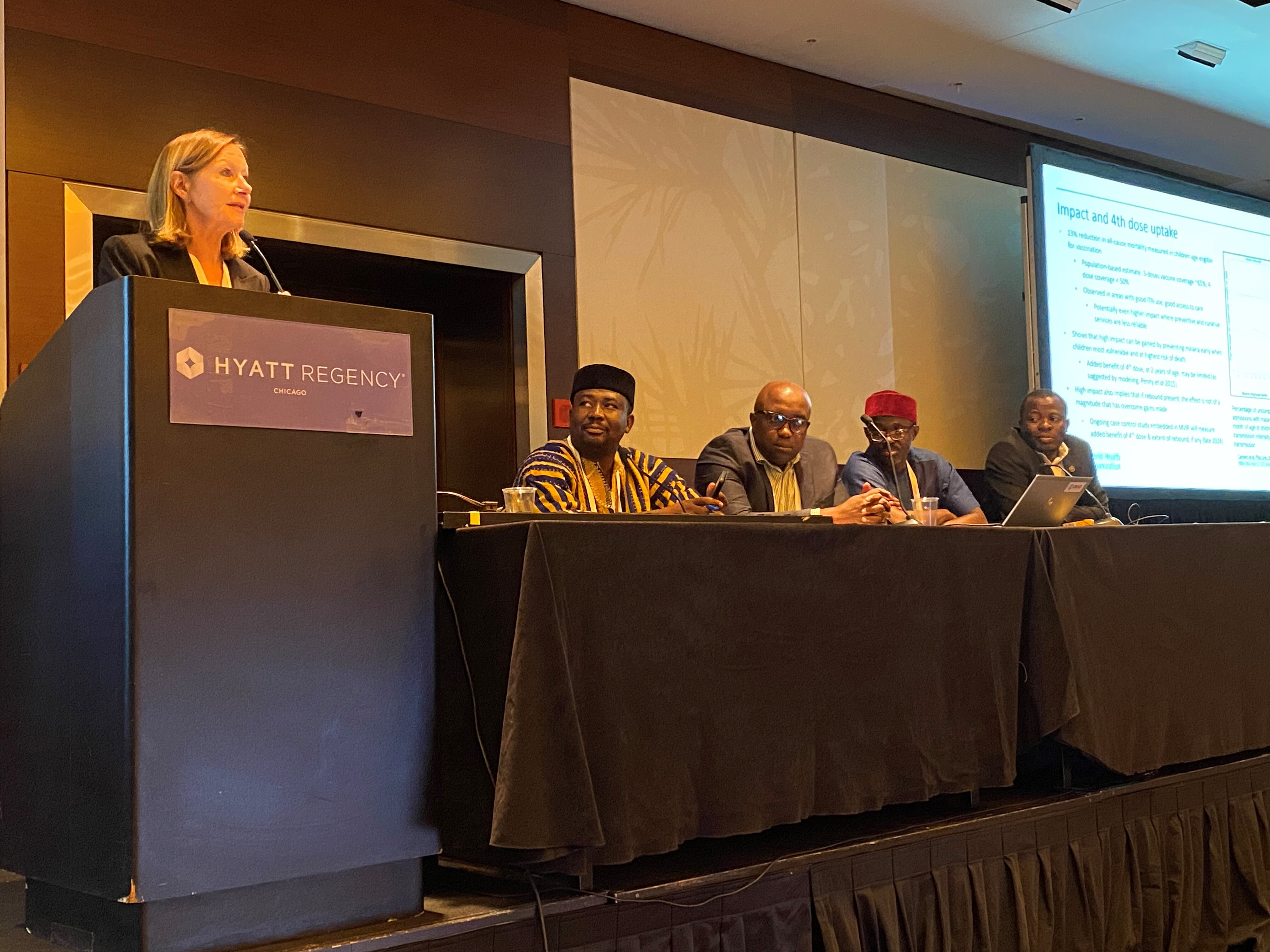ASTMH Annual Meeting 2025
blogHigh-impact results from the Malaria Vaccine Implementation Programme (MVIP)
By: John Bawa, Path, Dr. Rafiq Okine, Who, and Kristen Kelleher, Who

John is the Africa Lead, Vaccine Implementation at PATH
Rafiq is a Technical Officer for the Global Malaria Programme at WHO
Kristen is the Policy & Advocacy Officer for the Department of Immunization, Vaccines and Biologicals at WHO
The results from 46 months of surveillance during RTS,S/AS01 implementation and scale up, as part of the Malaria Vaccine Implementation Programme, MVIP, presented for the first time today show that the pilot introduction of the RTS,S/AS01 malaria vaccination in Ghana, Kenya and Malawi has reduced mortality among children age-eligible for vaccination by 13%, and hospital admissions with severe malaria by 22%. These findings were measured in the context of increasing vaccine uptake over the surveillance period, with an average coverage of the first three vaccine doses of about 65%. The findings demonstrate that the incorporation of malaria vaccines into routine child immunizations can have substantial impact on child health, child survival and malaria control.
The new data were presented by Dr. Kwaku Poku Asante, Kintampo Health Research Centre, one of the principal investigators of the MVIP evaluation team, as part of “Symposium 72: Evidence and Lessons learned from the Malaria Vaccine Implementation Programme (2019-2023)”.
Other key findings from the MVIP include:
- Vaccine uptake is high, with no reduction in ITN use, uptake of other vaccines, or change in health-seeking behavior.
- Community demand and health worker acceptability is high.
- The vaccine continues to demonstrate a strong safety profile, after more than 6 million doses provided.
- Vaccine delivery is equitable by gender and socioeconomic status and vaccine is reaching children who are not using other forms of malaria prevention.
The MVIP was established by WHO to evaluate the public health use of the RTS,S malaria vaccine in selected settings in Africa, and initial findings informed the first WHO recommendation for a malaria vaccine in October 2021. Considerations from the MVIP provided critical information for the recently updated WHO recommendation for malaria vaccines that applies to both RTS,S and R21/Matrix-M vaccines.
Additional speakers in the scientific session, which was co-chaired by Mr. John Bawa of PATH and Dr. Rafiq Okine of WHO, addressed lessons learned from the pilot programme and future implications for malaria vaccines.
Other speaker highlights:
- Dr. Kwame Amponsa-Achiano, Ghana Ministry of Health, discussed lessons learned from pilot introductions in Ghana. He emphasized the importance of close coordination between the national immunization and malaria control programmes. He acknowledged the value of health worker training and readiness to respond to any questions or misinformation promptly to build trust in vaccines. He noted that Ghana has aligned the malaria vaccine fourth dose with other second year of life vaccine visits to increase uptake.
- Dr. Mary Hamel, WHO, presented key takeaways from the MVIP. She noted that the MVIP establishes that a moderately efficacious malaria vaccine will be accepted and can have high effectiveness and impact. She discussed that high impact was observed despite suboptimal vaccine coverage, including suboptimal fourth dose coverage. The robust evidence from the pilot evaluation resulted in the establishment of the Gavi Malaria Vaccine Programme and support for scale-up, she said. She emphasized that the MVIP provided critical information that has a forged a pathway for future malaria vaccines, including the second malaria vaccine, R21/Matrix-M.
- Mr. John Bawa, PATH, emphasized the unprecedented demand for malaria vaccines.
Gavi has approved 18 countries to support broad vaccine rollout starting in 2024, and at least 28 countries in Africa plan to introduce the vaccine. The initial supply of RTS,S/AS01 is limited, and insufficient to meet the high demand. Recently, WHO recommended a second malaria vaccine, R21/Matrix-M; with two malaria vaccines available, supply is expected to be sufficient to benefit all children living in areas where malaria is a public health risk. Tens of thousands of lives could be saved every year with the broad rollout of these malaria vaccines.
Related Posts
By: Matthew Davis, Burness